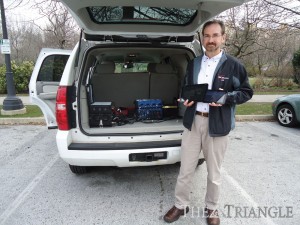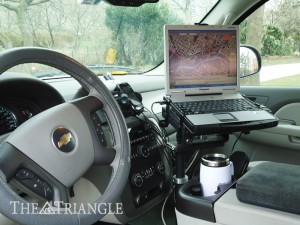
Equipped with a Chevy Tahoe, advanced computer programming and phones from the top commercial wireless cell phone carriers, representatives drove around the University City campus comparing carrier performance side by side.
Using what are known as Harvard sentences, a set of standardized phrases designed to include all vocal syllables possible in the English language, the computer software routed verbal cues to the cell phones in the back of the vehicle, which then called a computer at a regional Verizon branch.
“We drive around a test area with the software running, and the program detects where various carriers drop calls or lose gaps of conversation,” Randy Madden, a Verizon tester, explained.
All of the testing was completed from the Verizon vehicles, and surveyors do not go inside buildings to test connectivity.
Madden says technicians and analysts use their findings to determine whether or not the cell tower cites need to be manipulated, whether more cable needs to be installed, or more towers need to be erected. This testing initiative is part of a larger goal of the company, to expand its 4G Long Term Evolution service, which the Verizon Thunderbolt and various tablets currently run on.
Expansion hasn’t been easy, noted Sheldon Jones, a Verizon media contact.
“We’ve literally built this technology from the ground up, erecting cell towers and expanding our reach,” Jones said.
Madden, who normally surveys the tri-state area, drove his test vehicle through the Drexel campus, between Arch and Chestnut streets, in order to accurately survey the central hub of campus.
Verizon Wireless refused to release the results of the survey, but assured that the company would take into account the results of the information. However, Madden did note that there were no anomalies on any carrier during the test.
“University City is such a densely populated area, so it makes sense that all the carriers would perform equally well,” he said.

“We actually built an entirely new network, which isn’t something our competitors can say,” Madden said.
Drexel students on various networks have experienced what it is like to have dropped calls on campus.
“The worst spot on campus for AT&T is definitely the Hans,” Julie Joyce, a freshman communication major, said. “It would be good if these wireless carriers followed through with improving connection on campus. I know lots of students on all different carriers have had problems with poor reception and dropped calls.”
Verizon analyzes the results of its surveys quarterly, and plans on revealing a second wave of 4G LTE coverage in 2012.


